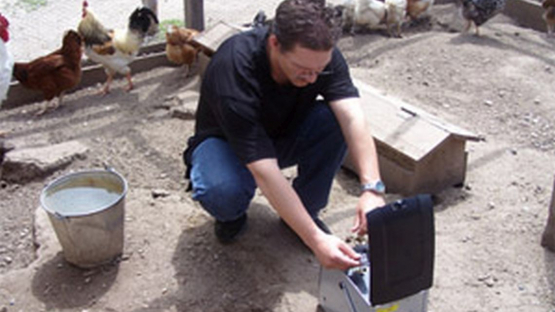Ms. Dao was asked if there were problems. She said, “We had four GeneSTAT machines running at once, all hooked to a computer. On one set of runs, we did not start the computer program for one device. We were worried, but it was no problem. GeneSTAT stored the result, and we were able to download it later. We also could see the result on the GeneSTAT device whether it was hooked up to a computer or not.

If you would like to learn more about the IAEA’s work, sign up for our weekly updates containing our most important news, multimedia and more.
The Agency Supports Portable Diagnostic Devices to Enhance "At-Source" Control of Transboundary Animal Diseases
Molecular genetic testing plays a vital role in safeguarding public health – from diagnosing disease to monitoring for pathogens with pandemic potential; from detecting potential bioterrorism threats to safeguarding the food supply via crop and farm animal surveillance.
Meanwhile, government agencies like the US Public Health Service and CDC, WHO and medical, emergency response and agriculture professionals are struggling to keep up with increasing demands of testing to ascertain safety and security. Finite financial resources, a shortfall in qualified technical personnel and time-consuming test technologies restricted to specially equipped laboratories have created an environment of need poorly served by the solutions currently available.
As a result of the FAO/IAEA Joint Centre funding from the CRP on the early and rapid diagnosis of transboundary diseases (D3.20.25), DxNA has completed as of 26-30 April 2010 the validation of its GeneSTAT system and H5N1 assay at the National Institute of Veterinary Research (NIVR) in Hanoi. DxNA LLC (See www.dxna.com) was established in June 2008 as the successor company to Dx Nucleic Analytics, which was founded in 2005. DxNA manufactures and markets a proprietary PCR-based disease detection platform which consists of a unique, rapid and portable PCR system which consists of a PCR analyzer and accompanying closed-system testing cartridge under the trademark GeneSTAT®. The system consists of a 4.5 Kg thermocyler and cartridges which receives a sample, processes the sample, automatically performs amplification and detection, and provides a reportable result within 70 minutes.
The testing was done under the direction of Dr. Nguyen Tien Dung, Head of the Virology Department at NIVR. Assistants within the NIVR who had actual hands on experience in running samples on the DxNA device were Dao Thanh Van, Dao Duy Tung, and Bui Ngoc Anh. Dr. Mark Rosenfeld from DxNA was in Hanoi to observe the work. He provided about 15 minutes of demonstration on how to use the GeneSTAT system, and then turned it over to “a remarkable group of technicians” to do the work. We were fortunate to have skilled laboratory people working with us in Vietnam. However, the GeneSTAT system is designed to be able to be used by unskilled workers with minimal training. As we say, “Anytime. Anyplace. By anyone.”
The official report of the Vietnam results was given in Rome at the FAO/IAEA Meeting on Rapid Reporting of Transboundary Diseases held between 10-14 May 2010. The experience of actually using these rapid, portable devices is best described by Ms. Dao, who said, “It was very easy to use! Sample preparation took about two minutes. We all learned how to use the GeneSTAT within a few minutes.”
When asked what she liked best about the GeneSTAT, she said “it was easy to understand how to use it. I put the sample into the cartridge, entered my information into the computer, pressed a button, and it processed the sample and gave us a result while we had some tea. It was wonderful.”

Muscovy Duck Tracheal on GeneSTAT 25-04-2010

Craig Mosman of DxNA, who was also in Hanoi for the testing, thanked the FAO/IAEA Joint Centre for the funding received to develop the GeneSTAT portable device and H5N1 test: “Our contract with the FAO/IAEA has been critical to the development of our GeneSTAT system.
As a result of that funding, we have proven our platform at three different respected laboratories. In addition to the validated H5N1 test, in 2009 DxNA received FDA Emergency Use Authorization for its H1N1 test, and is continuously developing new tests in both the human and veterinary markets to serve our customers. We are now making GeneSTAT available to member states, and look forward to a continued working relationship with the FAO/IAEA Joint Centre.”

